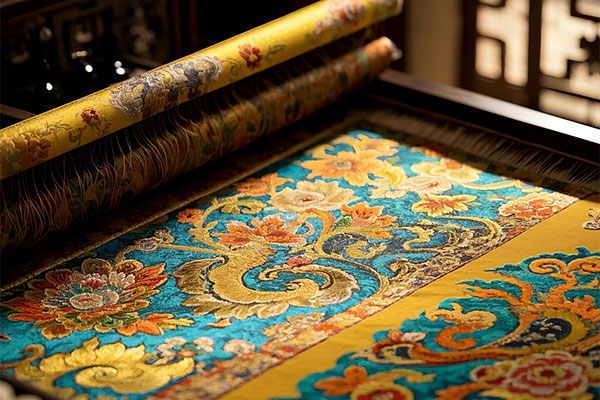Chinese Intangible Cultural Heritage - Nanjing Yunjin Brocade
Introduction
Nanjing Yunjin brocade, renowned as "radiant as the clouds at sunset," represents the pinnacle of traditional Chinese silk weaving craftsmanship. Alongside Sichuan Shu brocade and Suzhou Song brocade, it's celebrated as one of China's "Three Great Brocades." In 2006, the traditional wooden-loom weaving technique of Nanjing Yunjin was inscribed on China's National Intangible Cultural Heritage List, followed by UNESCO's Representative List of the Intangible Cultural Heritage of Humanity in 2009. Famous for its exquisite materials, superb craftsmanship, and magnificent patterns, Yunjin served as imperial tribute throughout Chinese history.
Historical Development
Origins and Evolution
- Eastern Jin Dynasty (317-420 AD): Establishment of professional brocade institutions in Nanjing
- Yuan Dynasty: Foundational "Eastern and Western Dyeing-Weaving Bureaus"
- Ming Dynasty: Reached technical zenith with complete system formation
- Qing Dynasty: Established "Jiangning Weaving Bureau" managed by Cao Xueqin's family
- Modern Era: Faced near extinction
- Contemporary: Revitalized through cultural preservation
Key Documentation
- Tiangong Kaiwu records imperial robe weaving techniques
- Dream of the Red Chamber frequently references Yunjin garments
- Jiangning Weaving Bureau Archives detail production records
Regional Characteristics
Technical Features
| Characteristics | Manifestations | Cultural Significance |
|---|---|---|
| Materials | Silk, gold threads, peacock feathers | Imperial grandeur |
| Colors | "No more than five colors" principle | Five Elements philosophy |
| Patterns | Dragons, phoenixes, peonies | Auspicious symbolism |
| Looms | Large wooden drawlooms | Ancient technology |
Cultural Significance
- Imperial Culture: Embodies feudal hierarchy
- Technical Wisdom: Culmination of traditional weaving
- Aesthetic Value: Represents ancient Chinese silk's highest achievement
- Literary Connection: Associated with Dream of the Red Chamber
Production Techniques
Core Processes
- Design:
- Pattern creation ("Tiaohua Jieben" programming)
- Color schemes
- Preparation:
- Material processing (gold threads, peacock feathers)
- Warp preparation
- Weaving:
- Two-weaver coordination
- "Continuous warp/discontinuous weft" technique
- Zhuanghua craftsmanship
- Finishing:
- Quality inspection
- Mounting
Unique Techniques
- "Zhuanghua": Signature Yunjin craftsmanship
- "Kujin": Gold-thread weaving
- "Peacock Feather": Special material application
- "Tiaohua Jieben": Ancient programming method
Preservation Efforts
- Successor Training: Establishing master workshops
- Technique Documentation: Digital process archiving
- Innovative Development: Modern application products
- Education: Specialized curriculum development
- International Exchange: Global heritage exhibitions
Modern Development
- Material innovation (eco-friendly alternatives)
- Design innovation (contemporary patterns)
- Application expansion (fashion, home decor)
- Digital preservation (Yunjin database)
- Cultural tourism (Yunjin Museum)
As the crowning achievement of ancient Chinese brocade, Nanjing Yunjin is gaining renewed vitality through innovative development and modern dissemination, becoming an important cultural ambassador showcasing traditional Chinese craftsmanship.







